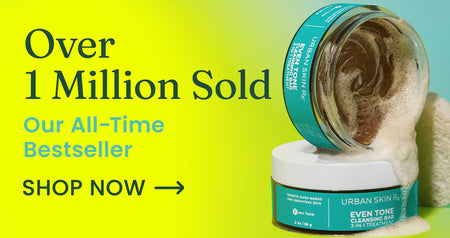Your Skin's Moisture Barrier: Can It Be Repaired?

It’s one of those skincare buzzwords that we hear so often you can probably use it in a sentence even if you don’t know it: moisture barrier. That mysterious aspect of our skin’s makeup that you know you want to protect… even though you may not know why or what it’s for. Like many things, having a better understanding of what it is and how it works is a crucial step on your journey toward skincare Nirvana. So without further adieu…
What Is Your Moisture Barrier?
Your skin has what’s known as a moisture barrier, also known as the epidermal barrier, if you’re feeling science-y. You don’t really need a super intense understanding of what this means — we’re not about to give you a skincare midterm (unless you’d be into that.)
But it’s helpful to have a more rounded understanding of the parts of your skin and the things that contribute to keeping it healthy, so you have a better base to work from next time you have a complexion issue you’d like to solve.
Your skin’s moisture barrier is basically just the hard, outermost layer of your outer layer of skin. This layer is called the stratum corneum, and it’s made up of, well, all of the dead skin cells your body is shedding.
While that might not sound like your skin’s sexiest layer, it’s crucial when it comes to sealing in water and electrolytes, which is absolutely non-negotiable if you want a healthy, glowing complexion. Keeping your moisture barrier healthy is key because maintaining proper hydration for your skin is basically the only way to get that gorgeous dewy look that makes people squint at your social media photos, trying to work out whether or not you’re using a filter.
And not only that, but your moisture barrier is basically your body’s first line of defense when it comes to keeping harmful toxins, germs and pathogens from infiltrating your skin and messing with your complexion, or worse, making you ill. So while vanity definitely comes into play here (which is normal; we’re not judging), your moisture barrier is also important to your health.
How Do You Keep Your Moisture Barrier Healthy?
If your skin feels and appears healthy by and large, it’s important to take some steps to keep it that way. Our skin starts to produce certain key components less frequently as we age.
Things like collagen and ceramides are superheroes for full, dewy skin, but as we get older, they aren’t as plentiful in our system… which is why we often use products to pick up the slack. Your skin barrier can also get weaker as you get older, and as we all know, the best care is preventative, so it’s worth being mindful of your moisture barrier in your skincare routine.
The best thing you can do for your moisture barrier is simplifying your skincare routine. While you may have worked out an incredible, well-researched rotation of products meant to tackle every possible issue you could have with your skin, you may be actually making your moisture barrier weaker over time.
A good indication that a product isn’t playing nice with your moisture barrier is any feeling of tightness or dryness after use. This is most common with certain types of cleansers and exfoliators. Even if you’re reluctant to cut back on skincare products, just start to be more mindful of how your skin feels after use. You might be surprised with how you actually feel when you check-in!
It’s also important to moisturize regularly. We recommend moisturizing in the morning after washing your face and after washing it for the second time in the evening. If you’re a plant parent, it might be helpful to think of your moisture barrier like one of your beloved houseplants: you need to keep it hydrated, or it isn’t going to bloom to its fullest potential!
And whichever moisturizer you use, always apply sunscreen in the morning. No matter how cloudy and grim the weather looks, if you’re going outside or are even spending time near a window during daylight hours, you’re going to want some SPF to keep your skin as healthy as possible. If you’re worried about overcomplicating your morning routine, consider using a product that combines moisturizer with an SPF.
How Do You Know if Your Moisture Barrier Is Healthy?
First and foremost, you probably already know if your skin is healthy or if it needs a bit of love. If you glow from within and your skin never looks dry, thirsty or cracked, you probably should be writing this article rather than reading it. That means that you’re doing a great job keeping your skin hydrated and maintaining your moisture barrier!
On the flip side, if you struggle with dry, flaky skin or notice a lot of redness and irritation, you might need to give this all-important layer of your skin a lot more love. Other common skin-related ailments like blemishes and sensitivity can also be symptoms of a moisture barrier that isn’t equipped to do its job.
Can You Repair Your Moisture Barrier?
What if you’re just now realizing that maybe a less-than-happy moisture barrier is the root of all of your skincare woes? It’s past time for preventative care — but is it possible to repair your moisture barrier if time, products or environmental issues have done it dirty?
Luckily, the answer is yes, and it’s also super easy and intuitive to do. You’ve probably already figured it out! If your moisture barrier is important largely because of its ability to retain water and electrolytes to keep your skin glowing and healthy, and it’s not performing to its fullest potential… Think of your house plants again. That’s right — you’re going to need to water it more frequently and consistently so that it recovers and provides your body with the protection and hydration it so desperately needs.
This may be confusing if you’re already moisturizing regularly and yet are still experiencing the symptoms of an ailing moisture barrier. There are two possible causes of your problem.
The first is simply that you’re not using the right moisturizer! You’re going to want to look for ingredients that are known to be humectants, which are ingredients that work by attracting and trapping water. They can even pull water from the air and attract it to your skin once applied, so if you’re looking for a hydration station — look no further.
You’ll want a moisturizer with Hyaluronic acid, Lactic acid or even certain plant oils. Another crucial ingredient to look for on any product label is Ceramides. Our body naturally produces Ceramides, but less and less as we age. This is important to realize because Ceramides make up a big part of your epidermis, and that’s the same layer of skin your moisture barrier is part of.
Basically, using a Ceramide cream can help prevent moisture loss and restore your skin’s moisture barrier, all the while giving you that perfectly-hydrated glow. Ceramide cream can be used in place of your moisturizer, so you’ll want to apply it after washing your face in the morning and the evening. And, bonus: Ceramide cream isn’t thought to have any negative side effects, so you don’t need to tread as carefully with it as you do with other skincare heroes.
In addition to using the right moisturizer, your moisture barrier will thank you for staying properly hydrated. If you’re not naturally a water drinker, spend a day logging the amount of water you drink — and then check out how much you should be drinking, depending on your height and weight. You’ll likely be shocked by how much more water your body needs to be as healthy as possible!
The other possibility, if you feel like you’re doing everything right but not getting results, is that you have an underlying issue or some significant damage that’s occurred to your skin barrier. If you’re concerned something more serious might be going on, it’s always worth speaking to a trusted doctor or dermatologist to get to the bottom of the problem so you can be confident that you’re on the right track when it comes to treatment.
In Conclusion
Your skin’s moisture barrier isn’t just some jargon from the internet — it’s a crucial part of your skin’s ecosystem. It’s what keeps your complexion bright and healthy, and it also protects you from all sorts of nasty little bits that might otherwise infiltrate your vulnerable skin and wreak havoc.
The best way to keep your skin’s moisture barrier healthy and repair it once something’s gone wrong is to get into a consistent and effective moisturizing routine and stay hydrated. As long as you keep your skincare routine on track, we’re sure your barrier will be as happy and healthy as you are.
Service Representative



